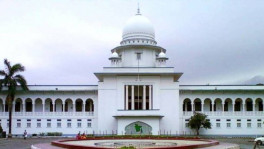Why access to information remains elusive after 15 years of legislation
TIB urged the interim govt to prioritise free speech and the right to information as essential to this new era

Bangladesh enacted legislation in 2009 to guarantee citizens' right to information, yet this right remains little more than a paper promise to this day.
"For a year and a half, I have been trying to get information from a Savar VAT office. Despite multiple attempts and even involving the High Court, I still have not received it," said Arup Roy, the Savar-Manikganj staff correspondent for Bangla daily Ajker Patrika.
Arup has been a journalist since 1980 and has worked with several leading national dailies. To date, he has filed 560 information requests to various offices.
"But I won't give up; I plan to return to court with a fresh plea," he said, reflecting on his challenges in obtaining information under the Right to Information Act, 2009.
On 5 February 2023, Arup requested information from the Customs Excise and VAT Office in Savar Circle concerning sweet factories, dealers, and hotels.
After not receiving the information within 20 working days, he appealed to the divisional VAT office.
When that failed, he approached the Information Commission on 16 April, but the VAT officer did not comply with the Commission's request. Despite a virtual hearing where the official was again asked to provide the information, he still did not do so.
Frustrated, Arup said, "I filed a writ petition in the High Court on 20 June 2024. Despite the court ordering the release of the information, my reapplication on 14 July was again denied. I will keep fighting and pursue my right to information."
Arup said since 2009, he has filed 560 requests to various offices for information. Of these, only 10% were fulfilled through standard channels, and 2% through appeals to higher authorities.
He obtained 50% of the information by filing complaints with the Information Commission. "All of these efforts to get information cost me around Tk4-5 lakh to date," Roy told TBS.
"When I file a complaint with the Information Commission, it feels as though I'm the one at fault," Arup said, suggesting that the Commission often prioritises protecting administrative activities over enforcing the law.
Established on 1 July 2009 under the Right to Information Act 2009, the Information Commission is meant to operate as an independent body.
According to the Commission's website, it handles complaints from citizens regarding the unavailability of information. Its primary role is to assist individuals in obtaining information from all public, private, and foreign-aided non-governmental organisations, while also encouraging compliance.
The Commission aims to resolve complaints related to information access and to impose disciplinary measures against those who provide false or misleading information.
However, service recipients alleged that the Commission has failed to function effectively and independently over the past 15 years, ruled by Sheikh Hasina-led Awami League.
'Commission should be free of political influence'
Hasibur Rahman, executive director of the Media Resources Development Initiative (MRDI), told TBS, "Accessing information after submitting an application is fraught with limitations, and critical information is seldom available this way."
Then there is Section 7 of the Act, which allows the authority not to provide certain information, he said.
"Section 6 of the Act addresses the voluntary disclosure of information, which is beneficial to the public. If all information were published on the government's 40,000 websites, it would alleviate many of the public's struggles," he said.
Moreover, the Information Commission's decisions are not enforced at the ground level. Their intended role should be to serve the public, he said, adding that the Commission should operate free from political influence.
Hasibur Rahman also pointed out that an analysis of the Commission's past judgments on information claims reveals that nearly 40% of requests come from journalists.
Even after 15 years, there remains a lack of awareness about this law and its application among the general public, he added.
TIB's 13-point to ensure right to info
On its website yesterday, Transparency International Bangladesh (TIB) unveiled 13-point recommendations to ensure the universal right to information, information accessibility and public participation.
The recommendations include effectively implementing the Right to Information Act, abolishing all legal and institutional obstacles, comprehensive reform of the Information Commission, and amending and repealing laws that conflict with the Right to Information Act etc.
TIB Executive Director Iftekharuzzaman told TBS the youth's remarkable sacrifices and the fall of the authoritarian regime have ignited extraordinary optimism for rebuilding a new Bangladesh.
"Freedom of speech, the right to dissent, and the unrestricted flow of information are integral aspirations of this vision. Ensuring the free flow of information is fundamental to our belief in creating a transparent, accountable and corruption-free Bangladesh," he said.
Iftekharuzzaman urged the interim government to prioritise free speech and the right to information as essential to this new era.


 Keep updated, follow The Business Standard's Google news channel
Keep updated, follow The Business Standard's Google news channel















